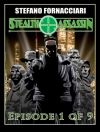With a preface by the irrepressible Patti Smith, The Divorce is a delightful book of several short amazing stories of chance meetings, bizarre circumstances, and even stranger visions of alternate realities written as only César Aira can
The Divorce tells about a man who takes a vacation from Providence, R.I. in early December to avoid conflicts with his newly divorced wife and small daughter. He travels to Buenos Aires and there, one afternoon, he encounters a series of the most magical coincidences. While sitting at an outdoor café, absorbed in conversation with a talented video artist, a young man with a bicycle is thoroughly drenched by a downpour of water seemingly from rain caught the night before in the overhead awning. The video artist knows the cyclist, who knew a mad hermetic sculptor, whose family used to take the Hindu God Krishna for walks in the neighborhood. More meetings, more whimsical and clever stories continue to weave reality with the absurd until the final, brilliant, wonderful, cataclysmic ending.Mengenai Pengarang
CÉSAR AIRA was born in Coronel Pringles, Argentina in 1949, and has lived in Buenos Aires since 1967. He taught at the University of Buenos Aires (about Copi and Rimbaud) and at the University of Rosario (Constructivism and Mallarmé), and has translated and edited books from France, England, Italy, Brazil, Spain, Mexico, and Venezuela. Perhaps one of the most prolific writers in Argentina, and certainly one of the most talked about in Latin America, Aira has published more than 100 books to date in Argentina, Mexico, Colombia, Venezuela, Chile, and Spain, which have been translated for France, Great Britain, Italy, Brazil, Portugal, Greece, Austria, Romania, Russia, and the United States. One novel, La prueba, has been made into a feature film, and How I Became a Nun was chosen as one of Argentina’s ten best books. Besides essays and novels Aira writes regularly for the Spanish newspaper El País. In addition to winning the 2021 Formentor Prize, he has received a Guggenheim scholarship, and was shortlisted for the Rómulo Gallegos prize and the Booker International Prize.












